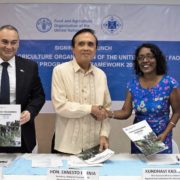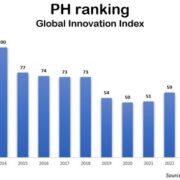
29 August 2018 – The Food and Agriculture Organization of the United Nations (FAO) and the Philippines have launched the new FAO Country Programming Framework (CPF) 2018 – 2024, a six-year plan that will contribute to achieving greater food security and improved nutrition, and further develop the country’s agricultural sector.
Kundhavi Kadiresan, FAO Assistant Director-General and Regional Representative for Asia and the Pacific together with the National Economic and Development Authority Director-General and Socio-economic Planning Secretary Ernesto Pernia, FAO Representative in the Philippines José Luis Fernández, and other partners from the government, private sector and civil society launched the new CPF in an event held at the UN House Manila in Mandaluyong City.
“In collaboration with development partners from the government, international development institutions, non-government organizations and the private sector, we have achieved a lot over the past four decades. But FAO and our partners also acknowledge, that there is much more to be done to ensure that every Filipino will have access to safe, affordable and nutritious food and is resilient against threats of climate change and human-induced disasters,” Kadiresan said.
FAO has pledged to continue support for the strengthening of resilience of Filipino communities against the threats of climate change and human-induced disasters. FAO will also work closely with Philippine partners on promoting resilient agriculture, sustainable management of natural resources that support community livelihoods, and a common understanding of diversity and inequalities of areas affected by conflict to accelerate peace and development in Mindanao.
Secretary Pernia said the framework “does not merely indicate cooperation but also our renewed commitment and partnership for development. FAO’s development experience and expertise, which match our needs and priorities, make them a strong and dependable partner in development.”
“Hence, this framework is focused on areas where FAO can make transformative contributions. These areas include human capital development, specifically the outcome on improved nutrition for all; economic opportunities in agriculture, fisheries, and forestry; ecological integrity; reducing vulnerability of individuals and families; and just and lasting peace.”
The CPF is aligned with the priorities of the Philippine Development Plan (PDP) 2017 – 2022, the United Nations – Philippine Partnership Framework for Sustainable Development (PFSD), the 2030 Agenda for Sustainable Development, as well as other national policies, strategies, and plans related to agriculture, fisheries, and forestry sector.
While reports indicate that there is enough food to feed the entire country, many Filipinos, especially children below the age of five, continue to suffer from malnutrition due to inadequate intake of food and nutrients. FAO will contribute to improving nutrition by strengthening capacities at the national and local levels on mobilizing resources, incorporating nutrition-sensitive food systems in development plans, and establishing or enhancing information systems related to food security and nutrition such as the Early Warning System-Food and Nutrition Security (EWS-FNS) and the Integrated Food Security Phase Classification (IPC).
The growth of the Philippines’ agriculture, forestry and fishery sectors continues to be hampered by declining productivity and non-competitiveness, due to the limited implementation of technology, degradation of natural resources, and high vulnerability to climate change. FAO will continue to help promote the sustainable management and competitive utilization of environment and natural resources through inclusive value chains.
“Now, more than ever, is the time when we need to focus our investments on agriculture and rural development so that we can move forward and get back on our feet faster than the threats and disasters that jeopardise our food security and that of generations to come,” Fernández said. “At FAO we firmly believe, and will continue to emphasize, that we cannot address poverty, hunger and malnutrition, foster lasting peace and build sustainable cities and resilient communities when people’s access to food and livelihoods especially in rural areas are not fully addressed.”
Fernández added that FAO will contribute to improving access of poor rural producers, small farmers, fisherfolks, agrarian reform beneficiaries, and other value chain actors, including indigenous peoples (IPs), to appropriate global production and post-harvest practices and technologies.






